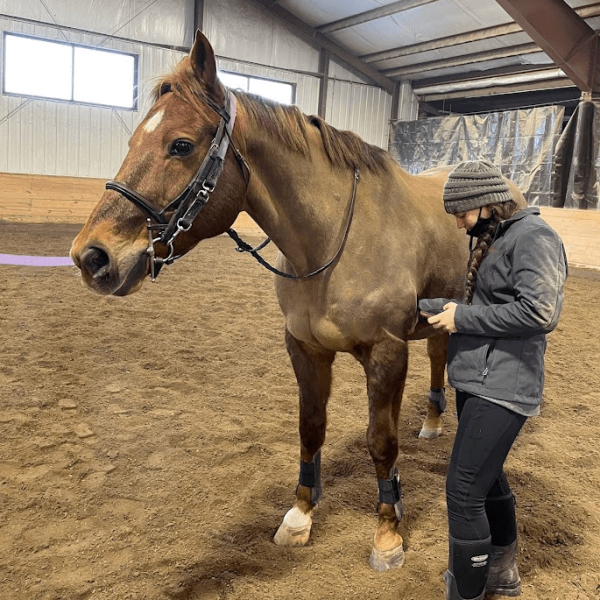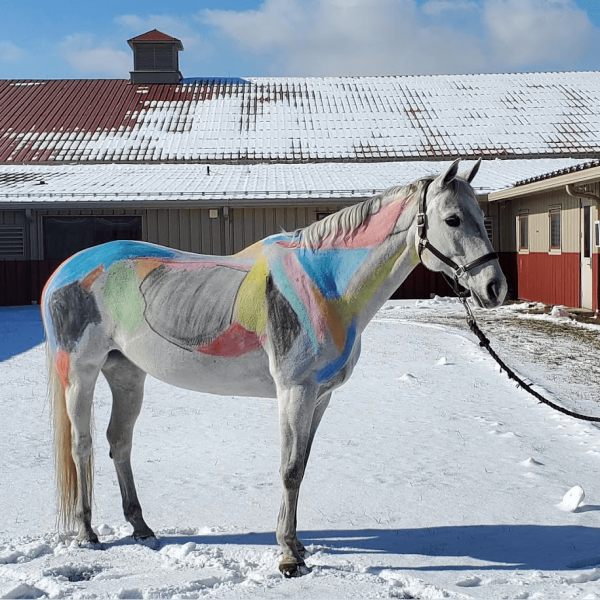B.S. in Equine Veterinary Technology
The Equine Veterinary Technology (EVT) program offers a unique curriculum through Otterbein University and Columbus State Community College (CSCC). Students in this program gain hands-on experience with horses and other species, graduate with two degrees, and are highly prepared to enter the veterinary field as Registered Veterinary Technicians. Veterinary technicians have roles in medical, surgical, laboratory, and office procedures. Veterinary technicians are not permitted to diagnose patients, perform surgery, or prescribe medications, but perform many other tasks within the veterinary setting.
Professional preparation
- EVT students graduate with an Associate of Applied Science Degree in Veterinary Technology from Columbus State Community College, as well as a Bachelor of Science Degree in Equine Veterinary Technology from Otterbein University.
- Our partners at CSCC maintain the accreditation standards; the program has been accredited by the American Veterinary Medical Association (AVMA) since 1974. The program is well known and respected within the veterinary field.
- Columbus State’s facility includes a clinical laboratory, examination room, and surgical, radiology and treatment suites. Otterbein’s Austin E. Knowlton Center for Equine Science is situated on 70 acres, and maintains 52 stalls, indoor and outdoor arenas, a cross-country course, an equine therapies space, a veterinary bay, and pastures/paddocks.
- Students sit for Veterinary Technician National Exam (VTNE) after graduating from the program, and upon passing, become credentialed.
 A student monitors Kermit's heart rate during an equine exercise physiology lab.
A student monitors Kermit's heart rate during an equine exercise physiology lab.
Hands-on experience
- Coursework involving clinical skills is taught by licensed veterinarians and/or registered veterinary technicians. Students learn myriad skills from basic handling and restraint techniques, to taking vital signs, to placing catheters, monitoring anesthesia, and performing lameness exams.
- Students gain hands-on experience with various species, including horses, dogs, cats, cattle, and laboratory animals. Coursework at Otterbein University provides more in-depth experience in equine veterinary medicine.
- Students in the program are required to intern at veterinary clinics during their Veterinary Practicum courses. There are over 170 approved veterinary clinical sites, including equine options.
 Annabelle, a school horse, during a lab where students draw the superficial and deep muscles of the horse.
Annabelle, a school horse, during a lab where students draw the superficial and deep muscles of the horse.
Career demand
- According to the Bureau of Labor Statistics, employment of veterinary technologists and technicians is projected to grow 15 percent from 2020 to 2030, faster than the average for all occupations.
- A bachelor’s degree allows graduates the flexibility to move into other positions that require that level of education, such as positions within universities, veterinary pharmaceutical field, management positions within veterinary corporations, research and development positions, or government positions.
- The additional equine experience and skills gained through this program are attractive to employers who are specifically seeking graduates for employment at equine or mixed-animal veterinary practices.
Options to meet the needs of students
There are two pathways for the EVT program: a traditional program and a 2+2.
- The traditional program allows students to begin their academic career at Otterbein and offers a more flexible application deadline for incoming students. Students who complete this program have a more traditional 4- year college experience, and can live in campus housing, take lessons, ride on the equestrian teams, and board/lease horses at the Knowlton Center. Students apply to CSCC during their freshman year, and complete CSCC coursework during their sophomore and junior years. While at CSCC, students are still able to live on Otterbein’s campus and continue riding.
- The 2+2 option allows students who start at CSCC to continue their education at Otterbein. Students complete their first two years at CSCC, and then take two years of coursework at Otterbein. Students can live in Otterbein housing, take lessons, ride on the equestrian teams, and board/lease horses at the Knowlton Center during their final two years while at Otterbein. For more information, visit our Columbus State Pathway Programs page.
| Student Learning Outcomes | University Learning Goals (KMERI*) |
| 1. Students will demonstrate proficiency in basic equine handling and management skills. | Knowledgeable, Multi-literate |
| 2. Students will demonstrate awareness of current issues related to the equine industry. | Knowledgeable, Multi-literate, Responsible |
| 3. Students will demonstrate applied knowledge of equine anatomy by documenting a comprehensive dissection project. | Knowledgeable, Engaged, Inquisitive |
| 4. Students will be proficient in veterinary clinical skills specific to their area of study. | Knowledgeable, Engaged, Inquisitive |
| 5. Students will understand and apply specific concepts related to their area of study and be an educational resource for the community. | Knowledgeable, Multi-literate, Engaged, Responsible |
| 6. Students will increase knowledge in area of study through Team Based Learning activities. | Engaged, Inquisitive |
| 7. Students will be able to evaluate veterinary and medical journals to broaden their understanding and working knowledge of veterinary medicine. | Knowledgeable, Multi-literate |
*NOTE: KMERI refers to Otterbein's learning goals. It stands for Knowledgeable, Multi-literate, Engaged, Responsible, and Inquisitive. To learn more about KMERI, visit our University Learning Goals page.
Apply
Now!